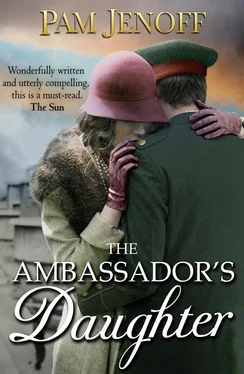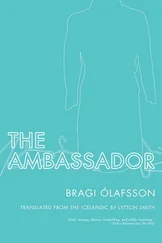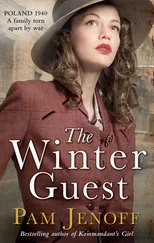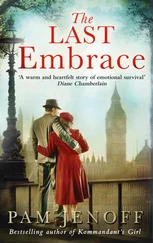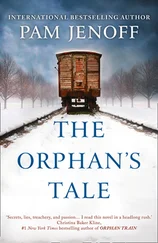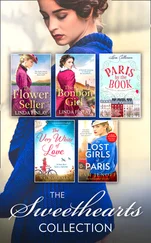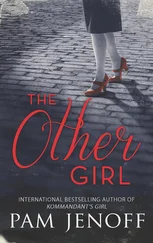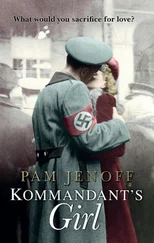1 ...6 7 8 10 11 12 ...20 “One has to eat,” Krysia replies vaguely, then turns to me. “Marcin is my husband.”
“Oh.” Krysia seems so solitary and stoic, an island unto herself. It is hard to imagine her needing or living with anyone.
“He plays cello.”
An older man, fiftyish and portly with a shock of white hair, pads over to the table and places fresh, foaming mugs of beer in front of us. “She’s too modest.” His vowels are rounded, as though his cheeks were full, a Russian accent unmuted by his time in France. “Marcin is one of the foremost cellists in Europe,” the man informs me. He begins twirling a coin between the knuckles of his left hand, index finger, middle, ring, pinky, and then back again without stopping. His fat fingers, each a sizable sausage, are surprisingly nimble. “He should be playing filled concert halls, not background music for wedding guests munching on canapés and cheap wine.”
The red-scarfed man beside me raises his glass. “Hear, hear.” His words are slurred.
Krysia pats the arm of the man who has handed us our drinks. “Margot, this principled fellow is Ignatz Stein.” I am surprised to hear her introduce the barman as a friend. “He owns this place.” I take a sip too large, caught off guard by the full, cold taste of hops, carrying me back to the fields of Bavaria in late harvest when Papa and I hiked there years earlier. The extra liquid spills out of the corner of my mouth. I reach for a napkin and, seeing none, furtively blot at the moisture with my sleeve, hoping no one will notice. Krysia turns to the man seated beside her. “And this is Deo Modigliani.”
“The artist?” I cannot help but blurt out, awestruck. I have studied his work, seen it in the finest galleries and museums. Yet here he is sitting in this nondescript café and drinking beer like everyone else. I’ve heard of this Paris, artists and writers gathering in the Montparnasse cafés to drink and share ideas. It exists beneath the surface, separate and secret from the pomp and formality of the conference and everyday life overhead.
Krysia does not answer but turns her attention to a debate on the future of Alsace-Lorraine that has heated up at the far end of the table. “Surely the territory will be returned to France now.” I have not been introduced to the man who is speaking.
“If the Americans and the French don’t tear one another apart first,” Krysia interjects. I nod. The conference is just days old and things had reportedly gotten quite contentious already.
“But the Americans …”
“It is quite easy to have views from halfway around the globe.” Her observation is unfair and yet at the same time true. The Americans came to help with the fighting and they are here to help make the peace. Yet they will return home, largely unscathed by what is decided here. So why are they at the center of it?
She continues, “If the conference is to be democratic, then why is so much being done by the Big Four behind closed doors? And where is Russia?” I watch in awe as Krysia speaks her mind in a forthright way, mixing logic and passion in the way of a woman long accustomed to debate. Holding court, she appears ethereal, bathed in light. I have seldom heard women offer up opinions and have never seen them received with such respect. There is a keen intensity to the way she speaks, her voice low and melodic and commanding, that makes her somehow beautiful.
“Did you hear a kitchen boy from the Orient sent Wilson a petition for his country’s freedom?” Modigliani offers, changing the subject.
“Ask Margot about it,” Krysia says, gesturing toward me with her head. “I was playing in one of the salons, but she saw the whole thing.”
“You were at the Wilson reception?” The barman, Ignatz, comes up to my chair, regarding me with newfound interest.
“Yes, my father is with the conference.”
“Her father is Friedrich Rosenthal,” Krysia adds with emphasis. Heads nod in recognition.
“Your father doesn’t write under a nom de plume,” Ignatz observes, still twirling a coin.
“No, why should he?”
“I think Ignatz only meant that not every writer has the courage to speak of such things in his own name,” Krysia clarifies. Courage . I recall the news from back home in Berlin, the violence that had erupted as a result of the civil unrest. Politicians has been shot for no more than their views. Could Papa and the other academics be in similar danger?
Modigliani leans in, his artist eyes soulful. “And what are you, ma petite? ”
“Deo,” Krysia warns in a low voice, protective like an older sister.
I am uncertain how to answer. “I’m engaged,” I offer. My response is met with blank stares around the table.
“I believe,” Krysia prompts gently, “that he was asking what you are planning to do now that the war is over?” Krysia’s clarification is of little help. Before the war, my future was clear—marriage to Stefan, the biggest question being whether to live with Papa indefinitely or save for an apartment of our own. That world is gone now. But still the old ties and expectations remain.
“I don’t know,” I confess finally. The room is warm and wobbly from the beer.
“How exciting.” I search for sarcasm in her voice and find none. “Starting fresh, reborn out of the ashes. The war was horrible, but it has shaken things up, given each of us a chance to stake a claim for what she wants.”
“They say that Kolchak’s Whites are making gains at Perm …” Ignatz offers, turning the topic to Russia. I sit back, grateful to no longer be the focus. But I find the topic unsettling. Russia has become a wild land since the czar was taken down, his whole family murdered. The Bolsheviks are in charge, or at least most think so—the country has largely been cut off from the West and so only rumors trickle out.
“Papa says we need to engage with the Whites as well as the Bolsheviks,” I say, speaking up in spite of my own desire to remain inconspicuous. I fight to keep the uncertainty from my voice. But I sound childish, falling back on my father’s opinions as if I have none of my own. “That is, perhaps we can help them to form some sort of coalition government….” I falter, unaccustomed to the eyes on me. Even the dark-eyed boy behind the bar appears to be listening with interest. I have discussed politics with Papa all my life, but never in a public forum such as this.
“What else does Papa say?” Ignatz asks from where he stands behind Krysia, a note of chiding to his voice.
“That the conference will move quickly to act before Russia can subsume too much territory.” I speak quickly now, too far gone to stop. “With a quick vote on recognition of the new Croat-Serb state, for example. The vote is to take place as soon as the conference opens. And it seems that Wilson and Lloyd George are favorably predisposed to a Pan-Slavic nation. But Clemenceau is likely to side with Orlando and the Italians and hold it up….”
“They can vote all they want. Lenin will not compromise on any sort of coalition,” Krysia remarks. She is talking about the Bolshevik leader not with the same fear I’ve heard at the parties, but with a kind of hushed reverence.
“You’re communist?” I ask, recalling her description of Papa’s work.
“I detest labels,” she replies coolly. “I’d say socialist, really, though there’s nothing wrong with communism as an ideal.”
Thinking of the stories I’ve read about Russia, I shudder. “It’s anarchy. They destroy businesses and overthrow leaders. They murdered the czar’s whole family, even the children.”
“That’s the problem with Germans,” one of the men scoffs derisively. “No stomach for reform. As Lenin says, revolution will never come to Berlin because the Germans would want to queue up for it.”
Читать дальше
